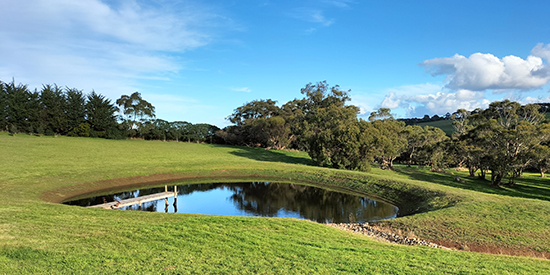Deakin to launch ambitious nature-based solutions to climate change
Media release
Deakin University's Blue Carbon Lab is set to begin ground-breaking research on nature-based solutions to climate change across Australia.
The two ambitious research projects, made possible by philanthropic funding from BHP, will work with the agricultural sector to establish scalable, replicable, and cost-effective ways to maximise the potential of blue (coastal wetlands) and teal (inland wetlands) carbon ecosystems to fight climate change.
The first project, led by Dr Melissa Wartman, will focus on upscaling cost-effective coastal wetland restoration activities through the exclusion of non-native hard-hooved animals from coastal wetland ecosystems. This will involve mapping the scale of opportunity across Australia, assessing farmers amenability to restoring coastal wetlands, quantifying the 'willingness to pay' for restoration outcomes of the general population, and investigating financing solutions (e.g., carbon markets).
The second project, led by Dr Martino Malerba, aims to improve the management of farm dams by reducing greenhouse gas emissions, improving water quality, and promoting local biodiversity. This project will monitor farm dams across Australia, engage farmers through citizen science workshops, and test innovative nature-based solution (e.g., floating wetlands) to increase their ecological and environmental values.
Director of Deakin's Blue Carbon Lab Professor Peter Macreadie said:
"We need to work together with industry to be able to genuinely reduce climate change. There is untapped potential to develop low-cost strategies for rehabilitating coastal wetlands and enhancing their carbon-sink capacity, and for managing farm dams to minimise their carbon footprint while also promoting biodiversity.
These projects aim to empower Australian landholders to protect coastal wetlands and significantly reduce the carbon footprint of their farm dams, contributing to Australia’s commitment to tackle climate change."
BHP's Group Climate and Sustainability Officer, Dr Fiona Wild said:
"We see great value in using nature-based solutions to mitigate climate change. In addition to the climate benefits, they also provide benefits to biodiversity and communities. BHP is pleased to support the work of Deakin University's Blue Carbon Lab in developing cost-effective ways to restore and protect coastal and inland wetlands."
Blue carbon refers to the carbon trapped and stored in vegetated, coastal ecosystems, primarily mangroves, tidal marshes, and seagrasses.
Similarly, teal carbon refers to carbon trapped in freshwater vegetated areas, such as farm dams and inland wetlands.
Both blue and teal carbon ecosystems are essential natural carbon sinks to mitigate climate change, as they can be extremely efficient at removing carbon dioxide from the atmosphere and locking it away in the soil for millennia (Malerba et al., 2022 One Earth and Macreadie et al., 2021 Nature Reviews Earth & Environment).
However, mismanagement of blue and teal carbon ecosystems can expose carbon reserves and release large amounts of trapped carbon back into the atmosphere. Research has shown that non-native hard-hooved species (such as cattle, sheep, buffalo, pigs, goats and donkeys) disturb soils and vegetation, resulting in significant CO₂ emissions and reduction in carbon stocks.
As a result, since European settlement, Australia lost much of its coastal wetlands with their carbon sequestration potential and other substantial benefits (such as coastal protection and shoreline stabilisation).
Simultaneously, farm dams - artificial ponds used to store water for agriculture – while essential to farming practices in Australia - have some of the highest greenhouse gas (GHG) emissions per unit area among freshwater ecosystems.
"Australia is uniquely positioned to make a decisive contribution to managing blue and teal carbon ecosystems," said Professor Macreadie. "Our scientists are world-leaders in the field, we have vast areas amenable to blue and teal carbon projects, we have growing stakeholder support for nature-based solutions for climate change mitigation and adaptation, and we are the world's largest contributor to blue carbon wealth (US$22.8 bn per year).
Restoring coastal wetlands and managing farm dams are two low-cost solutions with large potential to reduce emissions and improve carbon sequestration at a national scale. The benefits of both these methods are well established in the scientific literature.
Ultimately, our goal is to develop nature-based management interventions that allow farmers to reduce their GHG emissions, sequester carbon, and improve ecological and environmental values of their land, while earning an income through carbon credits by doing so."

